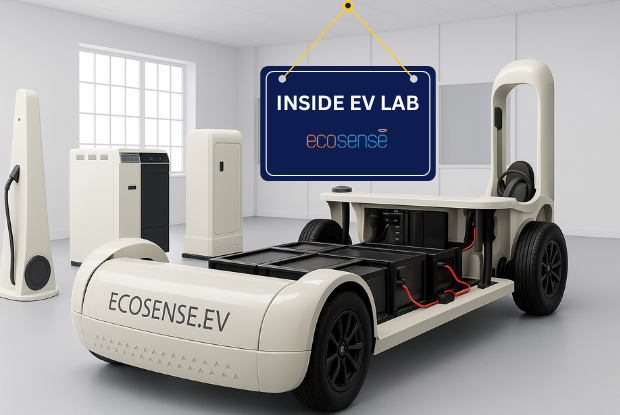Inside an EV Lab: A Hands-On Learning Experience with Ecosense
As the global transition to electric mobility accelerates,
the need for practical, hands-on education in electric vehicle (EV)
technologies has never been more urgent. To bridge the gap between theory and
application, Ecosense has designed a comprehensive and modular Electric Vehicle
Lab, tailored for universities, polytechnic institutes, and engineering
colleges.
This lab does not just teach about EVs—it simulates the
entire EV ecosystem, offering students, researchers, and educators a real-world
platform to understand, experiment, and innovate.
Why Ecosense’s Electric Vehicle Lab?
While EVs offer clear advantages—low fuel costs, minimal
emissions, and reduced maintenance—they also introduce new challenges. The
workforce entering the EV industry must not only understand batteries and
motors but also master drive cycles, charging protocols, power electronics, and
vehicle dynamics.
To address this, Ecosense developed RTSCET (Real-Time Simulation and Control in Electrified Transportation)—a turnkey EV education solution based on four pillars:
- Wholesome knowledge and
research opportunity
- Integrated learning
environment
- Real-time simulations using
actual EV components
- Open-source control algorithms and modifiable test cases
Key Focus Areas in the Lab
The EV Lab is divided into two major components:
- MECARP: Modular Electric
Car Learning Platform
- CONSOLE: Control System of Integrated Learning Environment (acts like the VCU)
These together provide complete visibility and control over
each part of the EV.
Let us walk through the hands-on systems that form the heart
of the lab:
Battery Cycler with Data Analytics
This platform enables in-depth testing and analysis of EV
traction batteries under various operating conditions.
Key Features:
- Charge/discharge using CC,
CV, CP modes
- Analysis at various C-rates
- Simulations at varying
temperatures using an environmental chamber
- Real-time state-of-health
(SoH) evaluation
- Data-driven selection of
batteries based on performance, cost, and lifecycle
- Continuous monitoring via FPGA controller + PC-based software
Students learn to compare new vs aged batteries, evaluate
degradation, and select optimal battery configurations based on actual data.
BMS Training and Research System
Battery Management Systems (BMS) are essential for safety and efficiency. This platform allows students to:
- Experiment with SoC
estimation algorithms (Coulomb counting, Kalman filter, etc.)
- Simulate and test
overvoltage, overcurrent, thermal protection
- Analyze active cell
balancing
- Understand thermal cut-offs
and protective logic
- Bring their own battery (BYOB) for testing and training
The platform is modular
and open-source, enabling students to test and even develop their own BMS logic
for customized applications.
EV Driveline Simulator
The EV drivetrain is simulated with all real components and
supplemented by a dynamometer to emulate real driving resistance.
Components Include:
- PMSM Motor
- Motor controller with
regenerative braking
- Power electronics and
converters
- Dynamometer for road
simulation
- Application software + FPGA controller for simulation and data analysis
·
Key Features:
- Drive Cycle Simulations
- Speed -Torque Curves
- Efficiency Maps
- Motor Analysis (4 quadrant)
- Open Source software with editable code
A critical system for drive testing, algorithm verification,
and understanding motor-inverter-dynamometer coordination.
Modular and Adaptive EVSE (Electric Vehicle Supply Equipment)
This platform enables deep dives into EV charging—from AC
slow charging to DC fast charging.
Learning Stages:
- Start-up Phase
- Communication between EV
and charger using OCPP, CCS, CAN protocols
- Charging Cycle
- Charging via onboard and
off-board chargers
- Monitoring voltage,
current, temperature
- Shutdown Phase
- Controlled termination of charging with proper handshake
The system’s open-source platform allows users to modify
charging algorithms and test charging strategies, enabling real-time learning
and development.
Meet CONSOLE: The Brain of the Lab
CONSOLE acts as the VCU and integrates all subsystems under one umbrella. Built on LabVIEW and FPGA, it enables:
- Real-time monitoring of
battery status, charging cycles, motor activity, and drive simulations
- Execution and recording of
test cases across modules
- Export of data for post-processing and research
CONSOLE provides a
single software window to control and analyze the complete EV ecosystem,
ensuring unified learning and ease of use.
Sample Experiments from the Lab
A. Battery Testing:
- Charging/discharging under
different C-rates
- SoH evaluation post
multiple cycles
- Performance at varying
ambient temperatures
- Fuel economy vs battery aging
B. BMS Testing:
- SoC estimation algorithm
comparison
- Thermal cutoff analysis
- Overvoltage and overcurrent testing
C. Drive Simulation:
- Torque-speed and dynamic
characteristics
- Drive cycle-based
performance mapping
- Inverter power flow analysis under varying loads
D. EVSE Testing:
- AC vs DC charging
characteristics
- Effect of algorithm tuning
on charge efficiency
- Communication diagnostics between EV and charger
Education Meets Innovation
The EV Lab is designed to progress from beginner-level to advanced research, enabling:
- Student projects and
internships
- MTech thesis support
- B.Tech/M.Tech final year
projects
- Faculty-led R&D and
publications
- Industry collaboration for product development
It also serves as a Centre of Excellence where industry professionals
and trainers can be upskilled in a structured environment.
Technical Edge
- Fully modular and scalable
system
- Integrated vehicle
simulation without the need for a physical EV
- Detailed software control
with data export for research
- Support for multiple drive
cycles and component configurations
- Safety-integrated system
suitable for classroom use
- Allows open algorithm development for BMS, motor control, and charging
Ecosense’s Electric Vehicle Lab is not just a set of
tools—it is a complete learning environment designed to prepare students for
the future of mobility. By focusing on real components, open development, and
holistic understanding, it empowers students to innovate, question, and build
solutions for a cleaner tomorrow.
Whether you are a university planning a new curriculum or an
engineering college aiming to lead in clean mobility education, the Ecosense EV
Lab offers the right blend of practicality, scalability, and academic depth.

